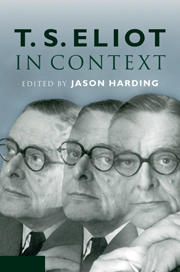Book contents
- Frontmatter
- Contents
- List of illustrations
- List of contributors
- Acknowledgements
- List of abbreviations
- Introduction
- PART ONE LIFE
- 1 St Louis
- 2 New England
- 3 Paris
- 4 London
- 5 Englishness
- 6 The idea of Europe
- PART TWO FORMS
- PART THREE LITERARY CROSS-CURRENTS
- PART FOUR POLITICS, SOCIETY AND CULTURE
- PART FIVE RECEPTION
- Further reading
- Index
3 - Paris
Published online by Cambridge University Press: 05 August 2012
- Frontmatter
- Contents
- List of illustrations
- List of contributors
- Acknowledgements
- List of abbreviations
- Introduction
- PART ONE LIFE
- 1 St Louis
- 2 New England
- 3 Paris
- 4 London
- 5 Englishness
- 6 The idea of Europe
- PART TWO FORMS
- PART THREE LITERARY CROSS-CURRENTS
- PART FOUR POLITICS, SOCIETY AND CULTURE
- PART FIVE RECEPTION
- Further reading
- Index
Summary
‘I cannot bear to think of your being alone in Paris, the very words give me a chill. English speaking countries seem so different from foreign. I do not admire the French nation, and have less confidence in individuals of that race than in English’ (L1, 12). Those are T. S. Eliot's mother's words in April 1910, after her son had told her he would spend a year in Paris following his graduation from Harvard. Although her reluctance was plain to read, he went nonetheless. In every respect, it was a decisive year. When Eliot departed for Paris, he felt a real temptation to become a French poet. When he returned to America a year later, he had decided against this move. What had happened? Eliot's mother provides a clue, for Eliot was ‘alone in Paris’ for two reasons. First, as his mother makes quite clear, he had broken with his American cultural background. Second, it was not easy to create new ties in his host country. In a letter of 1914 to his friend Conrad Aiken, Eliot admitted that his stay in Paris occasioned ‘one of those nervous sexual attacks which I suffer from when alone in a city’ (L1, 82). It was no accident that the poems contained in his first collection, Prufrock and Other Observations (1917), examine the theme of urban dereliction after the manner of two French poets, Baudelaire and Laforgue.
- Type
- Chapter
- Information
- T. S. Eliot in Context , pp. 25 - 32Publisher: Cambridge University PressPrint publication year: 2011
- 2
- Cited by



